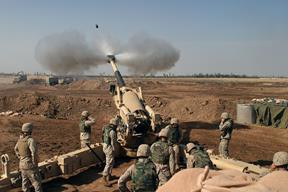Kyiv, the capital city of Ukraine, experienced one of the most extensive drone attacks since the onset of the war with Russia. Early Saturday, the city was rattled by a series of drone strikes that injured at least five people, including an 11-year-old girl, and caused widespread damage across various districts.
This unprecedented assault involved nearly 75 drones, primarily Iranian-made Shahed models, launched towards Kyiv from multiple directions, including Russia's Primorsko-Akhtarsk and Kursk regions. Ukrainian air defense units were engaged in a strenuous effort to counter the aerial onslaught, successfully intercepting 71 drones. This included anti-aircraft missile troops, tactical aviation, mobile fire groups, and electronic warfare units. Additionally, a Kh-59 guided missile was neutralized in the Dnipropetrovsk region.
Air force chief Mykola Oleschuk commended the effectiveness of Ukraine's air defenses, particularly the 'mobile fire' units, which played a crucial role in downing about 40% of the drones. Despite these efforts, the attack left significant destruction in its wake, with nearly 200 buildings, including 77 residential structures, losing power. Ukraine's energy ministry and DTEK, a national energy company, worked diligently to restore electricity to affected areas.
The timing of the attack, coinciding with Ukraine's commemoration of the Holodomor famine, was noted by President Volodymyr Zelenskiy as a deliberate act of terror by Russia. He condemned the Russian leadership for its pride in such destructive capabilities.
This latest incident underscores the ongoing threat to Ukraine's energy infrastructure. Last winter, Russia executed a sustained campaign of missile and drone attacks targeting the country's power grid. While DTEK has fortified defenses and restored damaged infrastructure, concerns persist about potential energy crises in the upcoming winter months.
The drone strikes also triggered alarms about the safety of nuclear facilities, as evidenced by previous incidents near the Khmelnytskyi Nuclear Power Plant. The International Atomic Energy Agency (IAEA) reported "powerful explosions" in the vicinity, causing significant distress but no critical damage to the plant.
In light of these developments, Ukrainians brace for further challenges to their energy grid, with many seeking off-grid solutions like energy storage systems and backup generators. The country's defense intelligence maintains that Russia's ability to successfully execute similar attacks might be more challenging this time around, given the bolstered defenses and heightened preparedness.
As the conflict continues, the international community remains alert to the evolving situation in Ukraine, particularly the heightened risks to civilian safety and critical infrastructure. The recent drone attacks in Kyiv mark a new phase in the ongoing conflict, highlighting the resilience of Ukrainian defenses and the persistent threat posed by Russian military strategies.




